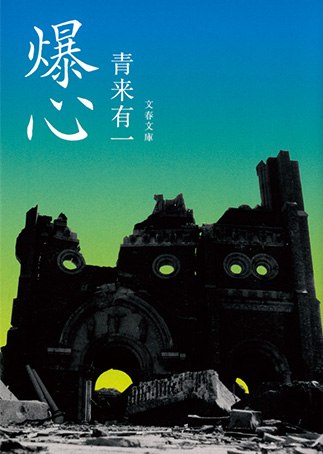
KYŪSHŪ
Bakushin
[trans. Ground Zero, Nagasaki]
Bungeishunjū (Bunshun Bunko), 2010. 336 pp. ¥619. ISBN 978-4-16-768502-7.
Also published in: English, German
Almost all of Seirai Yūichi’s works are set in Nagasaki. However, there are two other obvious reasons for calling him a “Nagasaki writer.” One is that his works inherit the tragic memories of the dropping of the atomic bomb on Nagasaki on August 9, 1945. (Seirai’s parents were bomb survivors, but he was born after the war, so he did not witness the tragedy of the bombing himself.) The other is that he is strongly aware of the tradition of “hidden Christians” in Nagasaki. Christianity began to spread in Japan after the late sixteenth century through missionaries such as Francis Xavier, but the religion was banned by the shogunate for much of the Edo period (1603–1868). In Nagasaki and surrounding areas, however, many people secretly held onto their faith as “hidden Christians” while being persecuted.
These two characteristics are clearly visible in this short story collection. The six works included in this collection are all set in contemporary Nagasaki, but they do not directly recount people’s experiences of the bombing or their Christian beliefs. Appearing in these stories are city folk who live in the city while harboring problems of their own, such as a man who is haunted by delusions and ends up murdering his beloved wife, a mentally disabled man who falls in love again and again with women he meets, and a married woman who indulges in an illicit love affair with a young man. In each work, however, there is a moment when something like a memory of the land suddenly comes back. By intertwining with the here and now of Nagasaki, these memories produce a unique world of “post- atomic-bomb literature.” (NM)
These two characteristics are clearly visible in this short story collection. The six works included in this collection are all set in contemporary Nagasaki, but they do not directly recount people’s experiences of the bombing or their Christian beliefs. Appearing in these stories are city folk who live in the city while harboring problems of their own, such as a man who is haunted by delusions and ends up murdering his beloved wife, a mentally disabled man who falls in love again and again with women he meets, and a married woman who indulges in an illicit love affair with a young man. In each work, however, there is a moment when something like a memory of the land suddenly comes back. By intertwining with the here and now of Nagasaki, these memories produce a unique world of “post- atomic-bomb literature.” (NM)

Translation rights inquiries
Bungeishunjū Ltd.
3-23 Kioi-chō, Chiyoda-ku, Tokyo 102-8008
Tel.: +81-3-3265-1211

